York University HLST 3540: Impact of International Agencies on Health
VerifiedAdded on 2022/09/18
|13
|3945
|25
Report
AI Summary
This report analyzes the influence of international agencies, particularly the World Trade Organization (WTO) and the World Bank, on global health policies and reforms. It begins by identifying and describing the impact of WTO treaties on global health, examining the implications of agreements on goods, intellectual property, and services. The report then delves into the World Bank's approach to health sector policy and reform in Costa Rica, highlighting its efficiency and equity blended approach. The report also discusses the interventions of International Financial Institutions (IFIs), including increased privatization, reduced public financing of health, and the reduction of union involvement in social security, analyzing the vulnerability of different countries to these interventions. The analysis draws on case studies of Argentina, Peru, and Costa Rica, examining the historical context, policy instruments, and outcomes of health sector reforms.
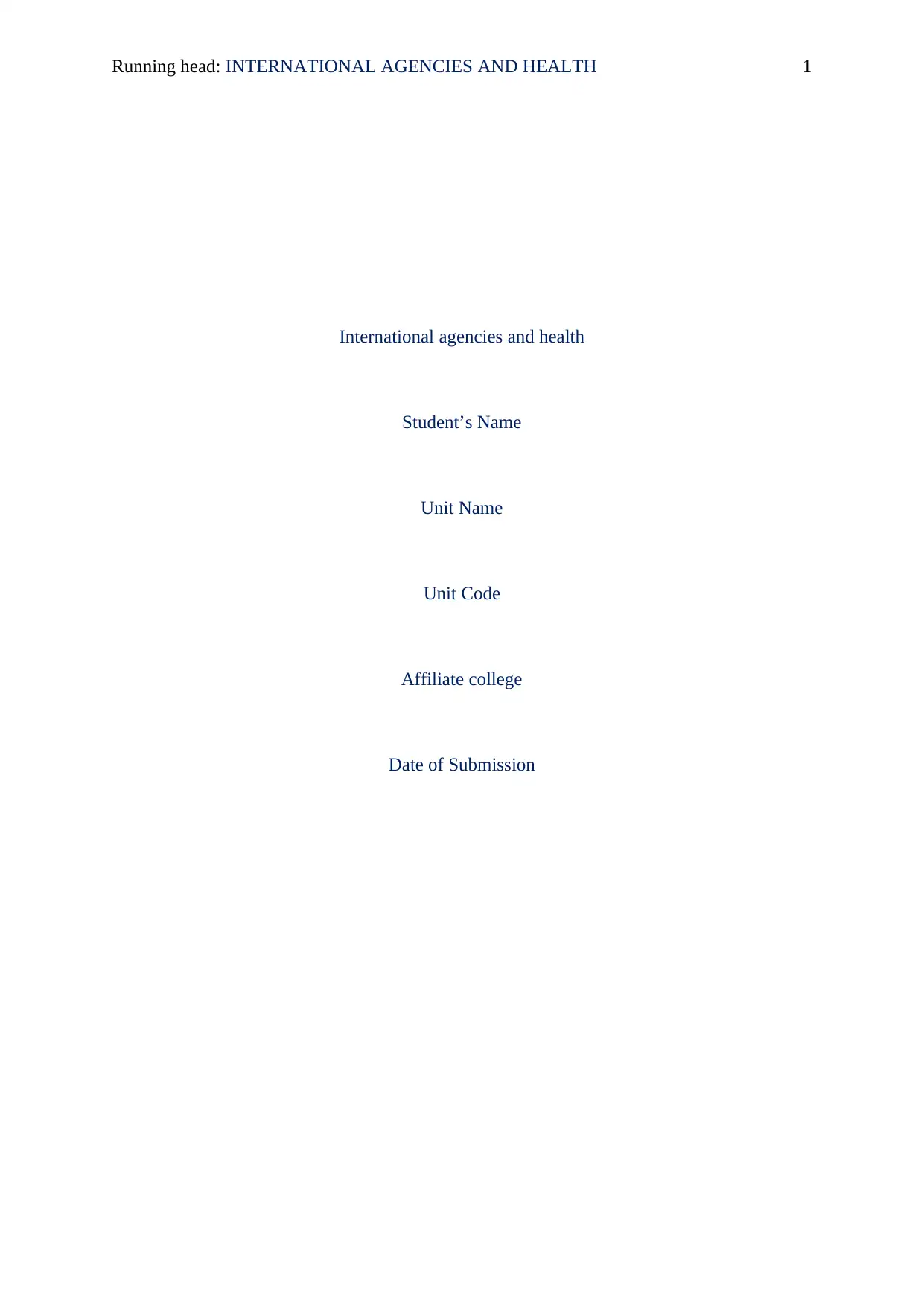
Running head: INTERNATIONAL AGENCIES AND HEALTH
International agencies and health
Student’s Name
Unit Name
Unit Code
Affiliate college
Date of Submission
1
International agencies and health
Student’s Name
Unit Name
Unit Code
Affiliate college
Date of Submission
1
Paraphrase This Document
Need a fresh take? Get an instant paraphrase of this document with our AI Paraphraser
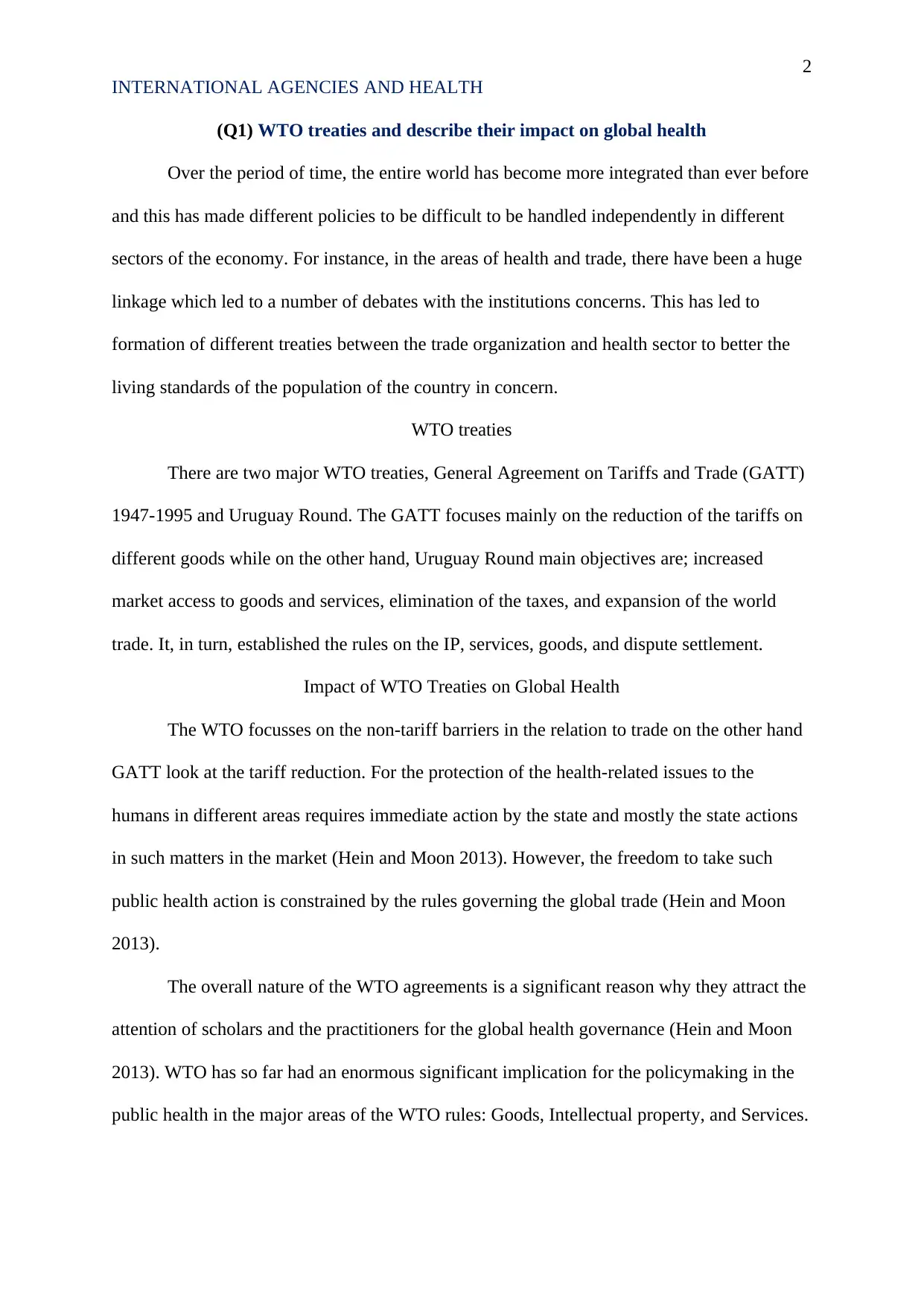
INTERNATIONAL AGENCIES AND HEALTH
(Q1) WTO treaties and describe their impact on global health
Over the period of time, the entire world has become more integrated than ever before
and this has made different policies to be difficult to be handled independently in different
sectors of the economy. For instance, in the areas of health and trade, there have been a huge
linkage which led to a number of debates with the institutions concerns. This has led to
formation of different treaties between the trade organization and health sector to better the
living standards of the population of the country in concern.
WTO treaties
There are two major WTO treaties, General Agreement on Tariffs and Trade (GATT)
1947-1995 and Uruguay Round. The GATT focuses mainly on the reduction of the tariffs on
different goods while on the other hand, Uruguay Round main objectives are; increased
market access to goods and services, elimination of the taxes, and expansion of the world
trade. It, in turn, established the rules on the IP, services, goods, and dispute settlement.
Impact of WTO Treaties on Global Health
The WTO focusses on the non-tariff barriers in the relation to trade on the other hand
GATT look at the tariff reduction. For the protection of the health-related issues to the
humans in different areas requires immediate action by the state and mostly the state actions
in such matters in the market (Hein and Moon 2013). However, the freedom to take such
public health action is constrained by the rules governing the global trade (Hein and Moon
2013).
The overall nature of the WTO agreements is a significant reason why they attract the
attention of scholars and the practitioners for the global health governance (Hein and Moon
2013). WTO has so far had an enormous significant implication for the policymaking in the
public health in the major areas of the WTO rules: Goods, Intellectual property, and Services.
2
(Q1) WTO treaties and describe their impact on global health
Over the period of time, the entire world has become more integrated than ever before
and this has made different policies to be difficult to be handled independently in different
sectors of the economy. For instance, in the areas of health and trade, there have been a huge
linkage which led to a number of debates with the institutions concerns. This has led to
formation of different treaties between the trade organization and health sector to better the
living standards of the population of the country in concern.
WTO treaties
There are two major WTO treaties, General Agreement on Tariffs and Trade (GATT)
1947-1995 and Uruguay Round. The GATT focuses mainly on the reduction of the tariffs on
different goods while on the other hand, Uruguay Round main objectives are; increased
market access to goods and services, elimination of the taxes, and expansion of the world
trade. It, in turn, established the rules on the IP, services, goods, and dispute settlement.
Impact of WTO Treaties on Global Health
The WTO focusses on the non-tariff barriers in the relation to trade on the other hand
GATT look at the tariff reduction. For the protection of the health-related issues to the
humans in different areas requires immediate action by the state and mostly the state actions
in such matters in the market (Hein and Moon 2013). However, the freedom to take such
public health action is constrained by the rules governing the global trade (Hein and Moon
2013).
The overall nature of the WTO agreements is a significant reason why they attract the
attention of scholars and the practitioners for the global health governance (Hein and Moon
2013). WTO has so far had an enormous significant implication for the policymaking in the
public health in the major areas of the WTO rules: Goods, Intellectual property, and Services.
2
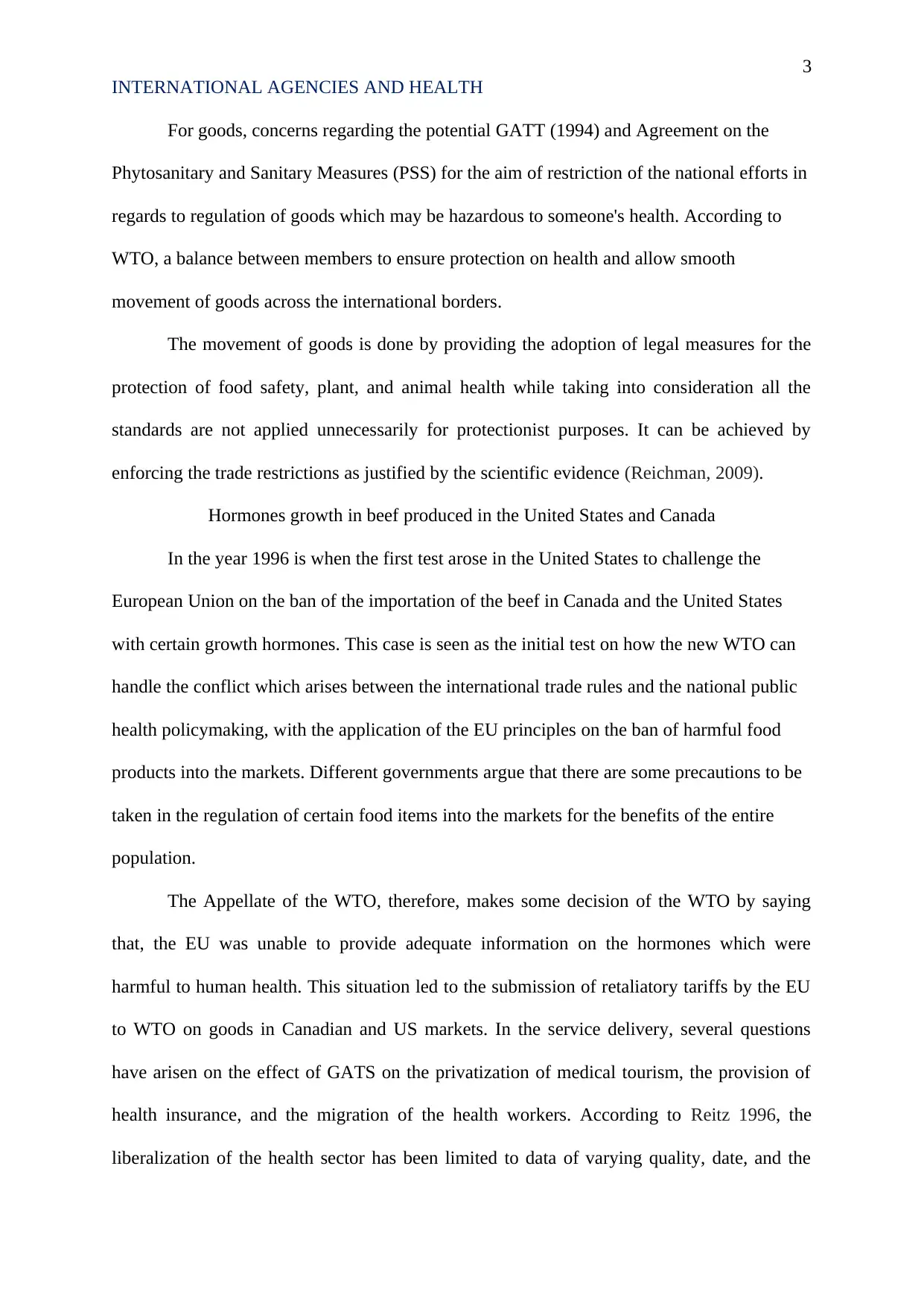
INTERNATIONAL AGENCIES AND HEALTH
For goods, concerns regarding the potential GATT (1994) and Agreement on the
Phytosanitary and Sanitary Measures (PSS) for the aim of restriction of the national efforts in
regards to regulation of goods which may be hazardous to someone's health. According to
WTO, a balance between members to ensure protection on health and allow smooth
movement of goods across the international borders.
The movement of goods is done by providing the adoption of legal measures for the
protection of food safety, plant, and animal health while taking into consideration all the
standards are not applied unnecessarily for protectionist purposes. It can be achieved by
enforcing the trade restrictions as justified by the scientific evidence (Reichman, 2009).
Hormones growth in beef produced in the United States and Canada
In the year 1996 is when the first test arose in the United States to challenge the
European Union on the ban of the importation of the beef in Canada and the United States
with certain growth hormones. This case is seen as the initial test on how the new WTO can
handle the conflict which arises between the international trade rules and the national public
health policymaking, with the application of the EU principles on the ban of harmful food
products into the markets. Different governments argue that there are some precautions to be
taken in the regulation of certain food items into the markets for the benefits of the entire
population.
The Appellate of the WTO, therefore, makes some decision of the WTO by saying
that, the EU was unable to provide adequate information on the hormones which were
harmful to human health. This situation led to the submission of retaliatory tariffs by the EU
to WTO on goods in Canadian and US markets. In the service delivery, several questions
have arisen on the effect of GATS on the privatization of medical tourism, the provision of
health insurance, and the migration of the health workers. According to Reitz 1996, the
liberalization of the health sector has been limited to data of varying quality, date, and the
3
For goods, concerns regarding the potential GATT (1994) and Agreement on the
Phytosanitary and Sanitary Measures (PSS) for the aim of restriction of the national efforts in
regards to regulation of goods which may be hazardous to someone's health. According to
WTO, a balance between members to ensure protection on health and allow smooth
movement of goods across the international borders.
The movement of goods is done by providing the adoption of legal measures for the
protection of food safety, plant, and animal health while taking into consideration all the
standards are not applied unnecessarily for protectionist purposes. It can be achieved by
enforcing the trade restrictions as justified by the scientific evidence (Reichman, 2009).
Hormones growth in beef produced in the United States and Canada
In the year 1996 is when the first test arose in the United States to challenge the
European Union on the ban of the importation of the beef in Canada and the United States
with certain growth hormones. This case is seen as the initial test on how the new WTO can
handle the conflict which arises between the international trade rules and the national public
health policymaking, with the application of the EU principles on the ban of harmful food
products into the markets. Different governments argue that there are some precautions to be
taken in the regulation of certain food items into the markets for the benefits of the entire
population.
The Appellate of the WTO, therefore, makes some decision of the WTO by saying
that, the EU was unable to provide adequate information on the hormones which were
harmful to human health. This situation led to the submission of retaliatory tariffs by the EU
to WTO on goods in Canadian and US markets. In the service delivery, several questions
have arisen on the effect of GATS on the privatization of medical tourism, the provision of
health insurance, and the migration of the health workers. According to Reitz 1996, the
liberalization of the health sector has been limited to data of varying quality, date, and the
3
⊘ This is a preview!⊘
Do you want full access?
Subscribe today to unlock all pages.

Trusted by 1+ million students worldwide
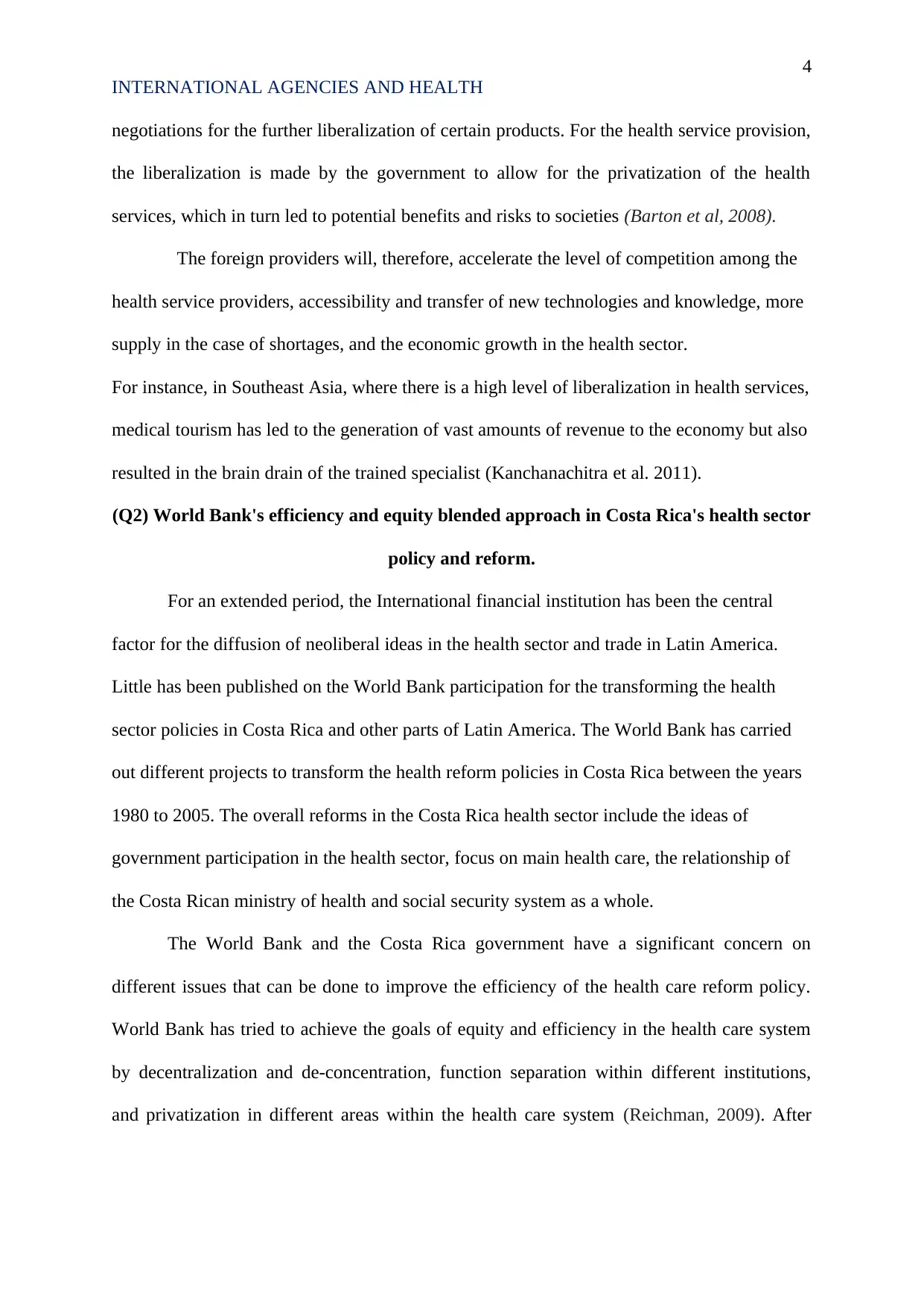
INTERNATIONAL AGENCIES AND HEALTH
negotiations for the further liberalization of certain products. For the health service provision,
the liberalization is made by the government to allow for the privatization of the health
services, which in turn led to potential benefits and risks to societies (Barton et al, 2008).
The foreign providers will, therefore, accelerate the level of competition among the
health service providers, accessibility and transfer of new technologies and knowledge, more
supply in the case of shortages, and the economic growth in the health sector.
For instance, in Southeast Asia, where there is a high level of liberalization in health services,
medical tourism has led to the generation of vast amounts of revenue to the economy but also
resulted in the brain drain of the trained specialist (Kanchanachitra et al. 2011).
(Q2) World Bank's efficiency and equity blended approach in Costa Rica's health sector
policy and reform.
For an extended period, the International financial institution has been the central
factor for the diffusion of neoliberal ideas in the health sector and trade in Latin America.
Little has been published on the World Bank participation for the transforming the health
sector policies in Costa Rica and other parts of Latin America. The World Bank has carried
out different projects to transform the health reform policies in Costa Rica between the years
1980 to 2005. The overall reforms in the Costa Rica health sector include the ideas of
government participation in the health sector, focus on main health care, the relationship of
the Costa Rican ministry of health and social security system as a whole.
The World Bank and the Costa Rica government have a significant concern on
different issues that can be done to improve the efficiency of the health care reform policy.
World Bank has tried to achieve the goals of equity and efficiency in the health care system
by decentralization and de-concentration, function separation within different institutions,
and privatization in different areas within the health care system (Reichman, 2009). After
4
negotiations for the further liberalization of certain products. For the health service provision,
the liberalization is made by the government to allow for the privatization of the health
services, which in turn led to potential benefits and risks to societies (Barton et al, 2008).
The foreign providers will, therefore, accelerate the level of competition among the
health service providers, accessibility and transfer of new technologies and knowledge, more
supply in the case of shortages, and the economic growth in the health sector.
For instance, in Southeast Asia, where there is a high level of liberalization in health services,
medical tourism has led to the generation of vast amounts of revenue to the economy but also
resulted in the brain drain of the trained specialist (Kanchanachitra et al. 2011).
(Q2) World Bank's efficiency and equity blended approach in Costa Rica's health sector
policy and reform.
For an extended period, the International financial institution has been the central
factor for the diffusion of neoliberal ideas in the health sector and trade in Latin America.
Little has been published on the World Bank participation for the transforming the health
sector policies in Costa Rica and other parts of Latin America. The World Bank has carried
out different projects to transform the health reform policies in Costa Rica between the years
1980 to 2005. The overall reforms in the Costa Rica health sector include the ideas of
government participation in the health sector, focus on main health care, the relationship of
the Costa Rican ministry of health and social security system as a whole.
The World Bank and the Costa Rica government have a significant concern on
different issues that can be done to improve the efficiency of the health care reform policy.
World Bank has tried to achieve the goals of equity and efficiency in the health care system
by decentralization and de-concentration, function separation within different institutions,
and privatization in different areas within the health care system (Reichman, 2009). After
4
Paraphrase This Document
Need a fresh take? Get an instant paraphrase of this document with our AI Paraphraser
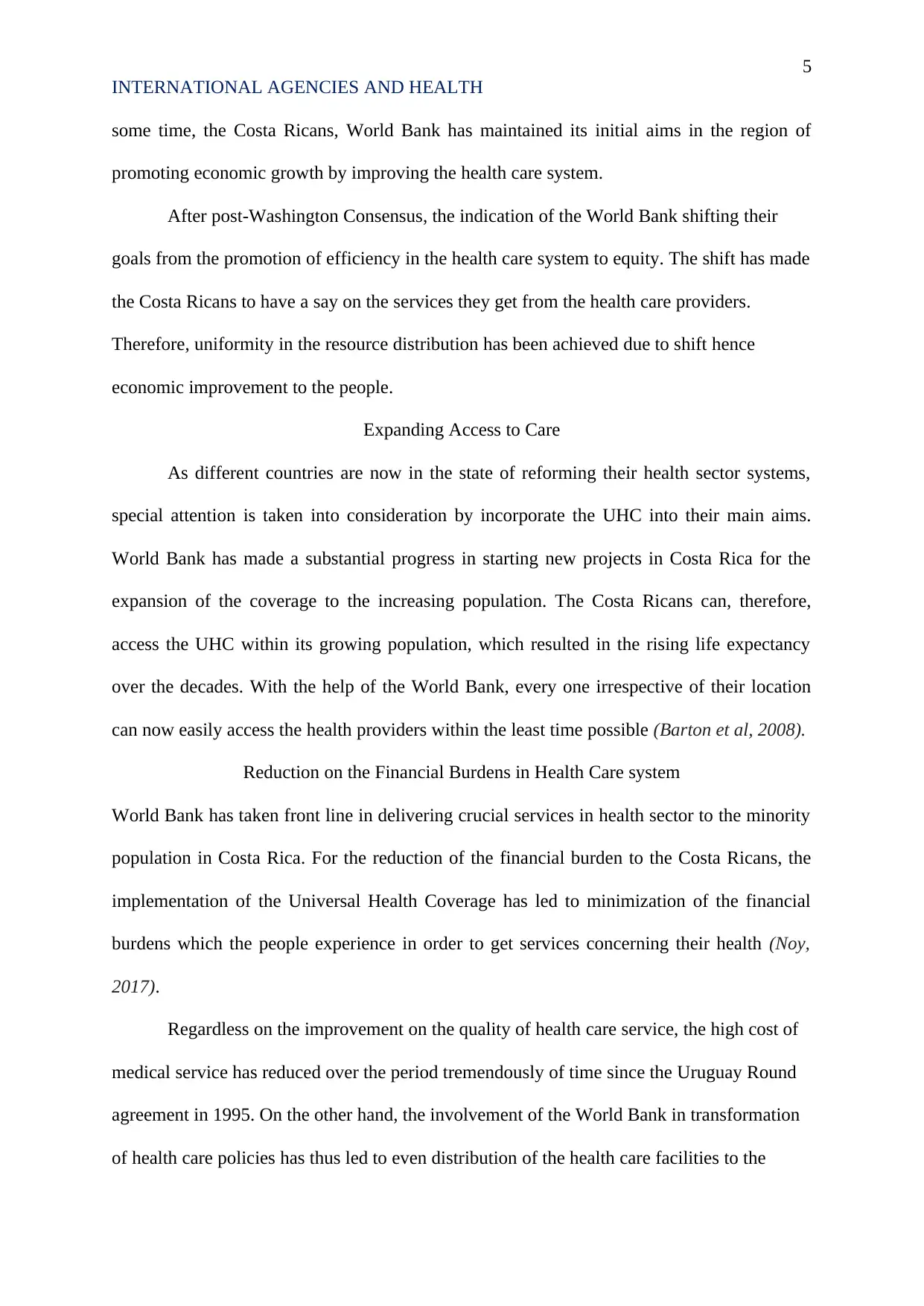
INTERNATIONAL AGENCIES AND HEALTH
some time, the Costa Ricans, World Bank has maintained its initial aims in the region of
promoting economic growth by improving the health care system.
After post-Washington Consensus, the indication of the World Bank shifting their
goals from the promotion of efficiency in the health care system to equity. The shift has made
the Costa Ricans to have a say on the services they get from the health care providers.
Therefore, uniformity in the resource distribution has been achieved due to shift hence
economic improvement to the people.
Expanding Access to Care
As different countries are now in the state of reforming their health sector systems,
special attention is taken into consideration by incorporate the UHC into their main aims.
World Bank has made a substantial progress in starting new projects in Costa Rica for the
expansion of the coverage to the increasing population. The Costa Ricans can, therefore,
access the UHC within its growing population, which resulted in the rising life expectancy
over the decades. With the help of the World Bank, every one irrespective of their location
can now easily access the health providers within the least time possible (Barton et al, 2008).
Reduction on the Financial Burdens in Health Care system
World Bank has taken front line in delivering crucial services in health sector to the minority
population in Costa Rica. For the reduction of the financial burden to the Costa Ricans, the
implementation of the Universal Health Coverage has led to minimization of the financial
burdens which the people experience in order to get services concerning their health (Noy,
2017).
Regardless on the improvement on the quality of health care service, the high cost of
medical service has reduced over the period tremendously of time since the Uruguay Round
agreement in 1995. On the other hand, the involvement of the World Bank in transformation
of health care policies has thus led to even distribution of the health care facilities to the
5
some time, the Costa Ricans, World Bank has maintained its initial aims in the region of
promoting economic growth by improving the health care system.
After post-Washington Consensus, the indication of the World Bank shifting their
goals from the promotion of efficiency in the health care system to equity. The shift has made
the Costa Ricans to have a say on the services they get from the health care providers.
Therefore, uniformity in the resource distribution has been achieved due to shift hence
economic improvement to the people.
Expanding Access to Care
As different countries are now in the state of reforming their health sector systems,
special attention is taken into consideration by incorporate the UHC into their main aims.
World Bank has made a substantial progress in starting new projects in Costa Rica for the
expansion of the coverage to the increasing population. The Costa Ricans can, therefore,
access the UHC within its growing population, which resulted in the rising life expectancy
over the decades. With the help of the World Bank, every one irrespective of their location
can now easily access the health providers within the least time possible (Barton et al, 2008).
Reduction on the Financial Burdens in Health Care system
World Bank has taken front line in delivering crucial services in health sector to the minority
population in Costa Rica. For the reduction of the financial burden to the Costa Ricans, the
implementation of the Universal Health Coverage has led to minimization of the financial
burdens which the people experience in order to get services concerning their health (Noy,
2017).
Regardless on the improvement on the quality of health care service, the high cost of
medical service has reduced over the period tremendously of time since the Uruguay Round
agreement in 1995. On the other hand, the involvement of the World Bank in transformation
of health care policies has thus led to even distribution of the health care facilities to the
5
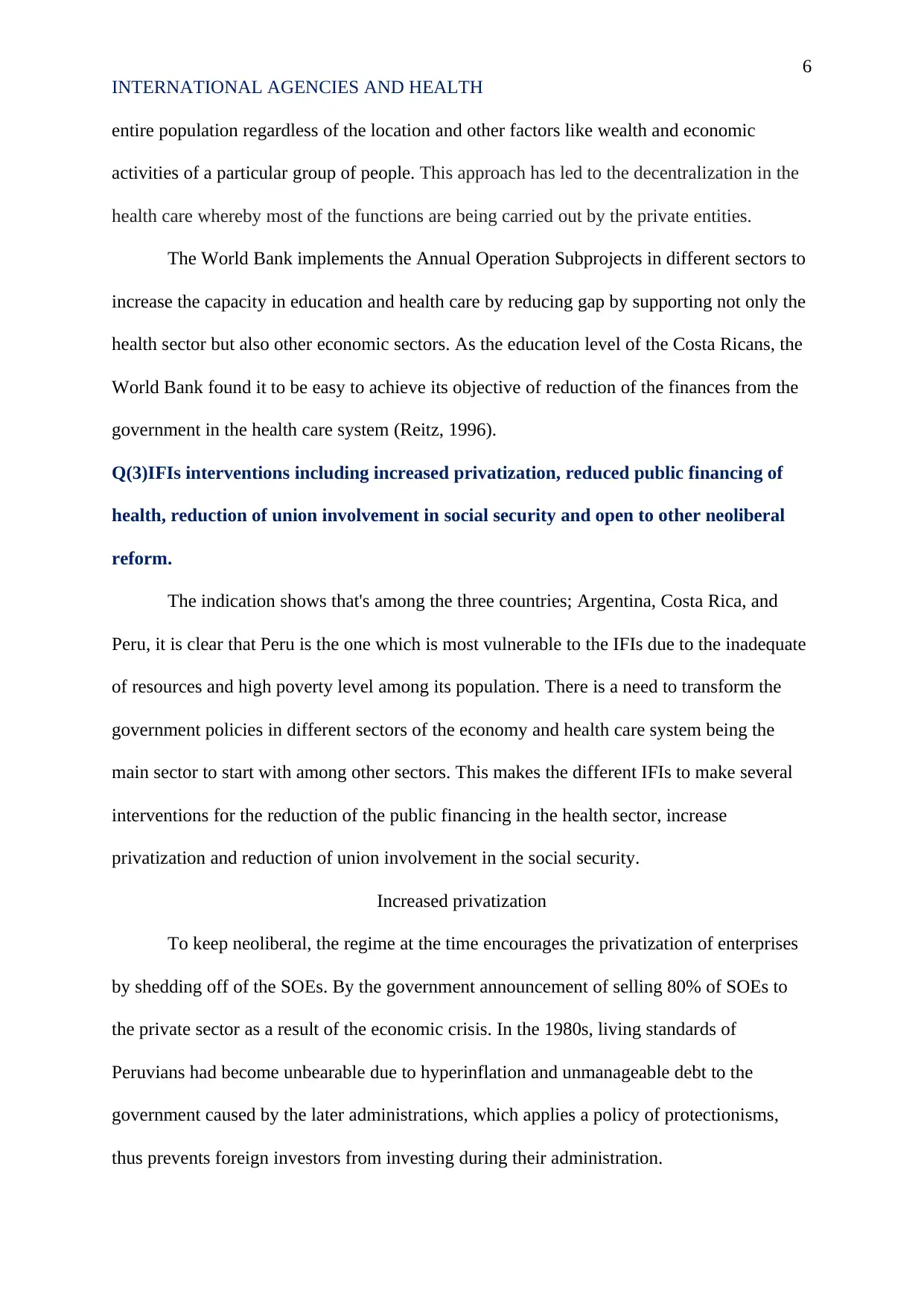
INTERNATIONAL AGENCIES AND HEALTH
entire population regardless of the location and other factors like wealth and economic
activities of a particular group of people. This approach has led to the decentralization in the
health care whereby most of the functions are being carried out by the private entities.
The World Bank implements the Annual Operation Subprojects in different sectors to
increase the capacity in education and health care by reducing gap by supporting not only the
health sector but also other economic sectors. As the education level of the Costa Ricans, the
World Bank found it to be easy to achieve its objective of reduction of the finances from the
government in the health care system (Reitz, 1996).
Q(3)IFIs interventions including increased privatization, reduced public financing of
health, reduction of union involvement in social security and open to other neoliberal
reform.
The indication shows that's among the three countries; Argentina, Costa Rica, and
Peru, it is clear that Peru is the one which is most vulnerable to the IFIs due to the inadequate
of resources and high poverty level among its population. There is a need to transform the
government policies in different sectors of the economy and health care system being the
main sector to start with among other sectors. This makes the different IFIs to make several
interventions for the reduction of the public financing in the health sector, increase
privatization and reduction of union involvement in the social security.
Increased privatization
To keep neoliberal, the regime at the time encourages the privatization of enterprises
by shedding off of the SOEs. By the government announcement of selling 80% of SOEs to
the private sector as a result of the economic crisis. In the 1980s, living standards of
Peruvians had become unbearable due to hyperinflation and unmanageable debt to the
government caused by the later administrations, which applies a policy of protectionisms,
thus prevents foreign investors from investing during their administration.
6
entire population regardless of the location and other factors like wealth and economic
activities of a particular group of people. This approach has led to the decentralization in the
health care whereby most of the functions are being carried out by the private entities.
The World Bank implements the Annual Operation Subprojects in different sectors to
increase the capacity in education and health care by reducing gap by supporting not only the
health sector but also other economic sectors. As the education level of the Costa Ricans, the
World Bank found it to be easy to achieve its objective of reduction of the finances from the
government in the health care system (Reitz, 1996).
Q(3)IFIs interventions including increased privatization, reduced public financing of
health, reduction of union involvement in social security and open to other neoliberal
reform.
The indication shows that's among the three countries; Argentina, Costa Rica, and
Peru, it is clear that Peru is the one which is most vulnerable to the IFIs due to the inadequate
of resources and high poverty level among its population. There is a need to transform the
government policies in different sectors of the economy and health care system being the
main sector to start with among other sectors. This makes the different IFIs to make several
interventions for the reduction of the public financing in the health sector, increase
privatization and reduction of union involvement in the social security.
Increased privatization
To keep neoliberal, the regime at the time encourages the privatization of enterprises
by shedding off of the SOEs. By the government announcement of selling 80% of SOEs to
the private sector as a result of the economic crisis. In the 1980s, living standards of
Peruvians had become unbearable due to hyperinflation and unmanageable debt to the
government caused by the later administrations, which applies a policy of protectionisms,
thus prevents foreign investors from investing during their administration.
6
⊘ This is a preview!⊘
Do you want full access?
Subscribe today to unlock all pages.

Trusted by 1+ million students worldwide
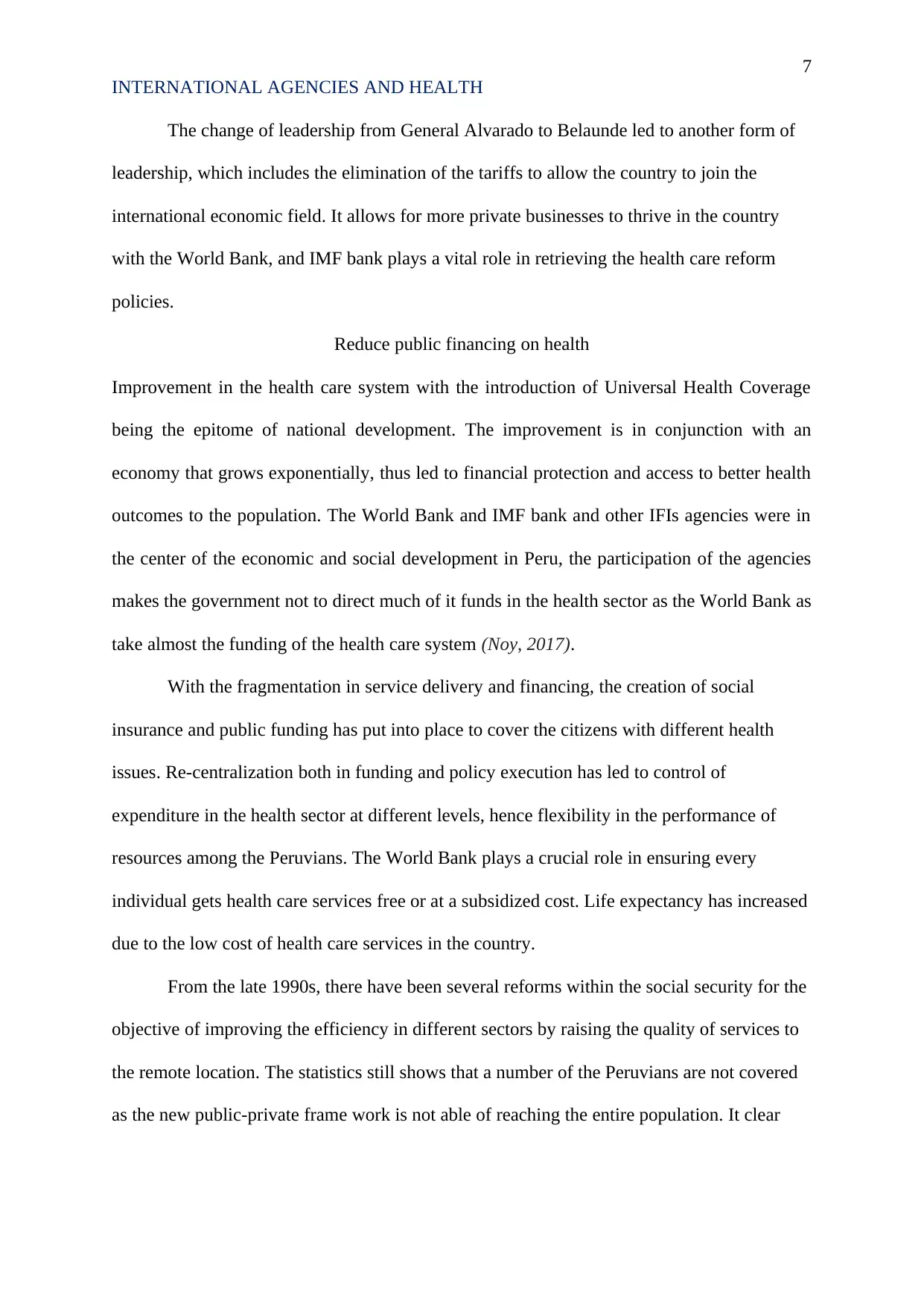
INTERNATIONAL AGENCIES AND HEALTH
The change of leadership from General Alvarado to Belaunde led to another form of
leadership, which includes the elimination of the tariffs to allow the country to join the
international economic field. It allows for more private businesses to thrive in the country
with the World Bank, and IMF bank plays a vital role in retrieving the health care reform
policies.
Reduce public financing on health
Improvement in the health care system with the introduction of Universal Health Coverage
being the epitome of national development. The improvement is in conjunction with an
economy that grows exponentially, thus led to financial protection and access to better health
outcomes to the population. The World Bank and IMF bank and other IFIs agencies were in
the center of the economic and social development in Peru, the participation of the agencies
makes the government not to direct much of it funds in the health sector as the World Bank as
take almost the funding of the health care system (Noy, 2017).
With the fragmentation in service delivery and financing, the creation of social
insurance and public funding has put into place to cover the citizens with different health
issues. Re-centralization both in funding and policy execution has led to control of
expenditure in the health sector at different levels, hence flexibility in the performance of
resources among the Peruvians. The World Bank plays a crucial role in ensuring every
individual gets health care services free or at a subsidized cost. Life expectancy has increased
due to the low cost of health care services in the country.
From the late 1990s, there have been several reforms within the social security for the
objective of improving the efficiency in different sectors by raising the quality of services to
the remote location. The statistics still shows that a number of the Peruvians are not covered
as the new public-private frame work is not able of reaching the entire population. It clear
7
The change of leadership from General Alvarado to Belaunde led to another form of
leadership, which includes the elimination of the tariffs to allow the country to join the
international economic field. It allows for more private businesses to thrive in the country
with the World Bank, and IMF bank plays a vital role in retrieving the health care reform
policies.
Reduce public financing on health
Improvement in the health care system with the introduction of Universal Health Coverage
being the epitome of national development. The improvement is in conjunction with an
economy that grows exponentially, thus led to financial protection and access to better health
outcomes to the population. The World Bank and IMF bank and other IFIs agencies were in
the center of the economic and social development in Peru, the participation of the agencies
makes the government not to direct much of it funds in the health sector as the World Bank as
take almost the funding of the health care system (Noy, 2017).
With the fragmentation in service delivery and financing, the creation of social
insurance and public funding has put into place to cover the citizens with different health
issues. Re-centralization both in funding and policy execution has led to control of
expenditure in the health sector at different levels, hence flexibility in the performance of
resources among the Peruvians. The World Bank plays a crucial role in ensuring every
individual gets health care services free or at a subsidized cost. Life expectancy has increased
due to the low cost of health care services in the country.
From the late 1990s, there have been several reforms within the social security for the
objective of improving the efficiency in different sectors by raising the quality of services to
the remote location. The statistics still shows that a number of the Peruvians are not covered
as the new public-private frame work is not able of reaching the entire population. It clear
7
Paraphrase This Document
Need a fresh take? Get an instant paraphrase of this document with our AI Paraphraser
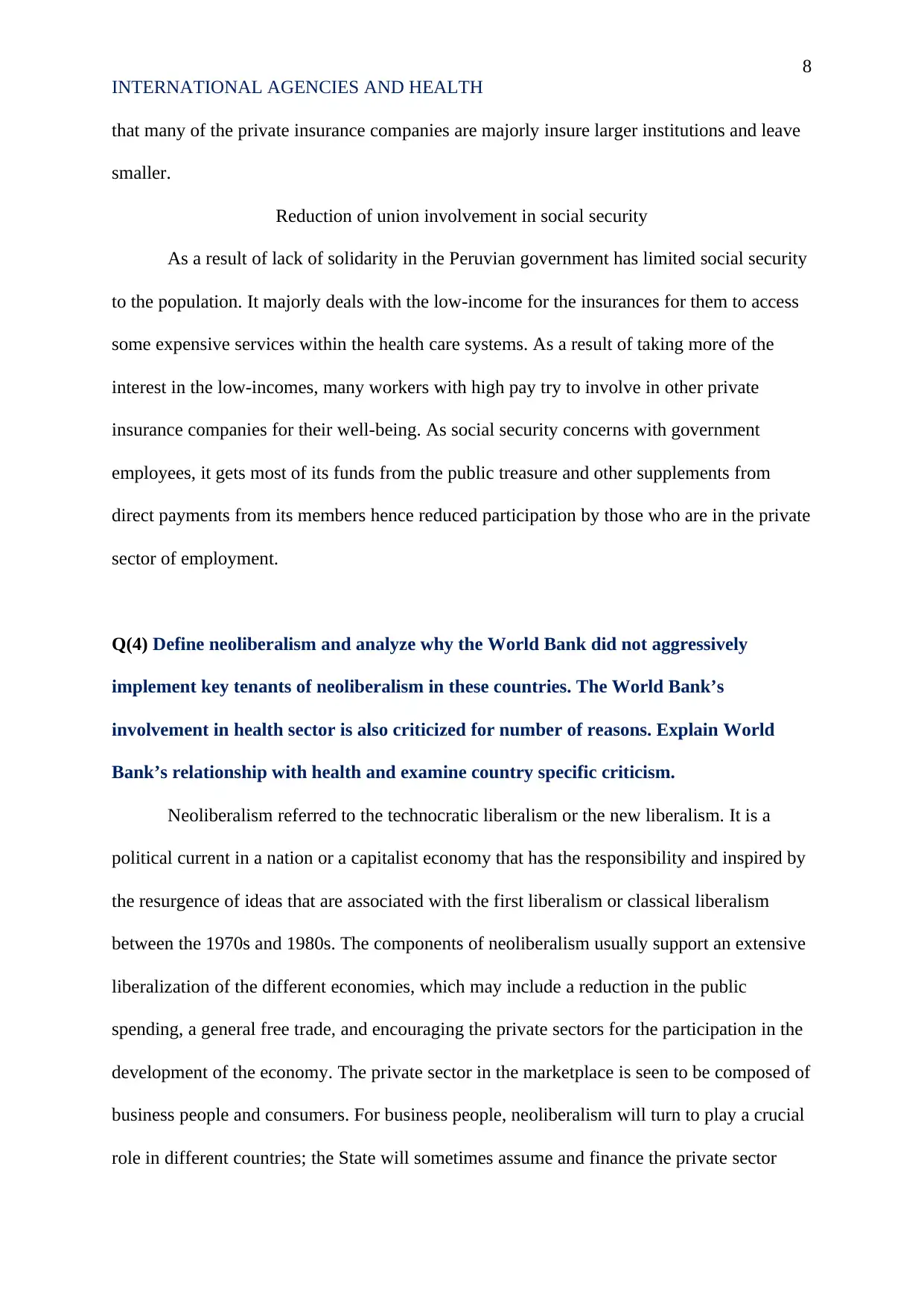
INTERNATIONAL AGENCIES AND HEALTH
that many of the private insurance companies are majorly insure larger institutions and leave
smaller.
Reduction of union involvement in social security
As a result of lack of solidarity in the Peruvian government has limited social security
to the population. It majorly deals with the low-income for the insurances for them to access
some expensive services within the health care systems. As a result of taking more of the
interest in the low-incomes, many workers with high pay try to involve in other private
insurance companies for their well-being. As social security concerns with government
employees, it gets most of its funds from the public treasure and other supplements from
direct payments from its members hence reduced participation by those who are in the private
sector of employment.
Q(4) Define neoliberalism and analyze why the World Bank did not aggressively
implement key tenants of neoliberalism in these countries. The World Bank’s
involvement in health sector is also criticized for number of reasons. Explain World
Bank’s relationship with health and examine country specific criticism.
Neoliberalism referred to the technocratic liberalism or the new liberalism. It is a
political current in a nation or a capitalist economy that has the responsibility and inspired by
the resurgence of ideas that are associated with the first liberalism or classical liberalism
between the 1970s and 1980s. The components of neoliberalism usually support an extensive
liberalization of the different economies, which may include a reduction in the public
spending, a general free trade, and encouraging the private sectors for the participation in the
development of the economy. The private sector in the marketplace is seen to be composed of
business people and consumers. For business people, neoliberalism will turn to play a crucial
role in different countries; the State will sometimes assume and finance the private sector
8
that many of the private insurance companies are majorly insure larger institutions and leave
smaller.
Reduction of union involvement in social security
As a result of lack of solidarity in the Peruvian government has limited social security
to the population. It majorly deals with the low-income for the insurances for them to access
some expensive services within the health care systems. As a result of taking more of the
interest in the low-incomes, many workers with high pay try to involve in other private
insurance companies for their well-being. As social security concerns with government
employees, it gets most of its funds from the public treasure and other supplements from
direct payments from its members hence reduced participation by those who are in the private
sector of employment.
Q(4) Define neoliberalism and analyze why the World Bank did not aggressively
implement key tenants of neoliberalism in these countries. The World Bank’s
involvement in health sector is also criticized for number of reasons. Explain World
Bank’s relationship with health and examine country specific criticism.
Neoliberalism referred to the technocratic liberalism or the new liberalism. It is a
political current in a nation or a capitalist economy that has the responsibility and inspired by
the resurgence of ideas that are associated with the first liberalism or classical liberalism
between the 1970s and 1980s. The components of neoliberalism usually support an extensive
liberalization of the different economies, which may include a reduction in the public
spending, a general free trade, and encouraging the private sectors for the participation in the
development of the economy. The private sector in the marketplace is seen to be composed of
business people and consumers. For business people, neoliberalism will turn to play a crucial
role in different countries; the State will sometimes assume and finance the private sector
8
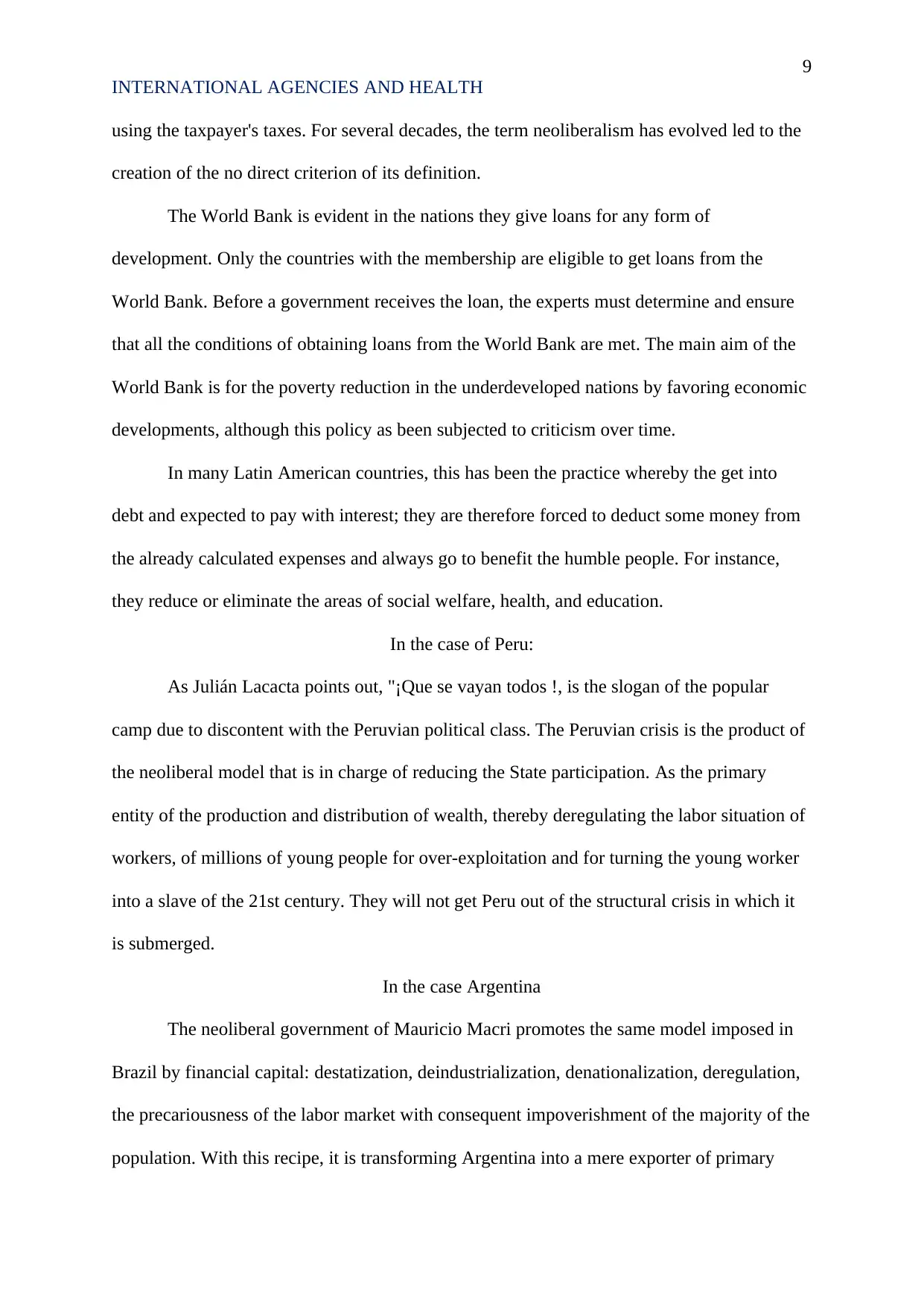
INTERNATIONAL AGENCIES AND HEALTH
using the taxpayer's taxes. For several decades, the term neoliberalism has evolved led to the
creation of the no direct criterion of its definition.
The World Bank is evident in the nations they give loans for any form of
development. Only the countries with the membership are eligible to get loans from the
World Bank. Before a government receives the loan, the experts must determine and ensure
that all the conditions of obtaining loans from the World Bank are met. The main aim of the
World Bank is for the poverty reduction in the underdeveloped nations by favoring economic
developments, although this policy as been subjected to criticism over time.
In many Latin American countries, this has been the practice whereby the get into
debt and expected to pay with interest; they are therefore forced to deduct some money from
the already calculated expenses and always go to benefit the humble people. For instance,
they reduce or eliminate the areas of social welfare, health, and education.
In the case of Peru:
As Julián Lacacta points out, "¡Que se vayan todos !, is the slogan of the popular
camp due to discontent with the Peruvian political class. The Peruvian crisis is the product of
the neoliberal model that is in charge of reducing the State participation. As the primary
entity of the production and distribution of wealth, thereby deregulating the labor situation of
workers, of millions of young people for over-exploitation and for turning the young worker
into a slave of the 21st century. They will not get Peru out of the structural crisis in which it
is submerged.
In the case Argentina
The neoliberal government of Mauricio Macri promotes the same model imposed in
Brazil by financial capital: destatization, deindustrialization, denationalization, deregulation,
the precariousness of the labor market with consequent impoverishment of the majority of the
population. With this recipe, it is transforming Argentina into a mere exporter of primary
9
using the taxpayer's taxes. For several decades, the term neoliberalism has evolved led to the
creation of the no direct criterion of its definition.
The World Bank is evident in the nations they give loans for any form of
development. Only the countries with the membership are eligible to get loans from the
World Bank. Before a government receives the loan, the experts must determine and ensure
that all the conditions of obtaining loans from the World Bank are met. The main aim of the
World Bank is for the poverty reduction in the underdeveloped nations by favoring economic
developments, although this policy as been subjected to criticism over time.
In many Latin American countries, this has been the practice whereby the get into
debt and expected to pay with interest; they are therefore forced to deduct some money from
the already calculated expenses and always go to benefit the humble people. For instance,
they reduce or eliminate the areas of social welfare, health, and education.
In the case of Peru:
As Julián Lacacta points out, "¡Que se vayan todos !, is the slogan of the popular
camp due to discontent with the Peruvian political class. The Peruvian crisis is the product of
the neoliberal model that is in charge of reducing the State participation. As the primary
entity of the production and distribution of wealth, thereby deregulating the labor situation of
workers, of millions of young people for over-exploitation and for turning the young worker
into a slave of the 21st century. They will not get Peru out of the structural crisis in which it
is submerged.
In the case Argentina
The neoliberal government of Mauricio Macri promotes the same model imposed in
Brazil by financial capital: destatization, deindustrialization, denationalization, deregulation,
the precariousness of the labor market with consequent impoverishment of the majority of the
population. With this recipe, it is transforming Argentina into a mere exporter of primary
9
⊘ This is a preview!⊘
Do you want full access?
Subscribe today to unlock all pages.

Trusted by 1+ million students worldwide
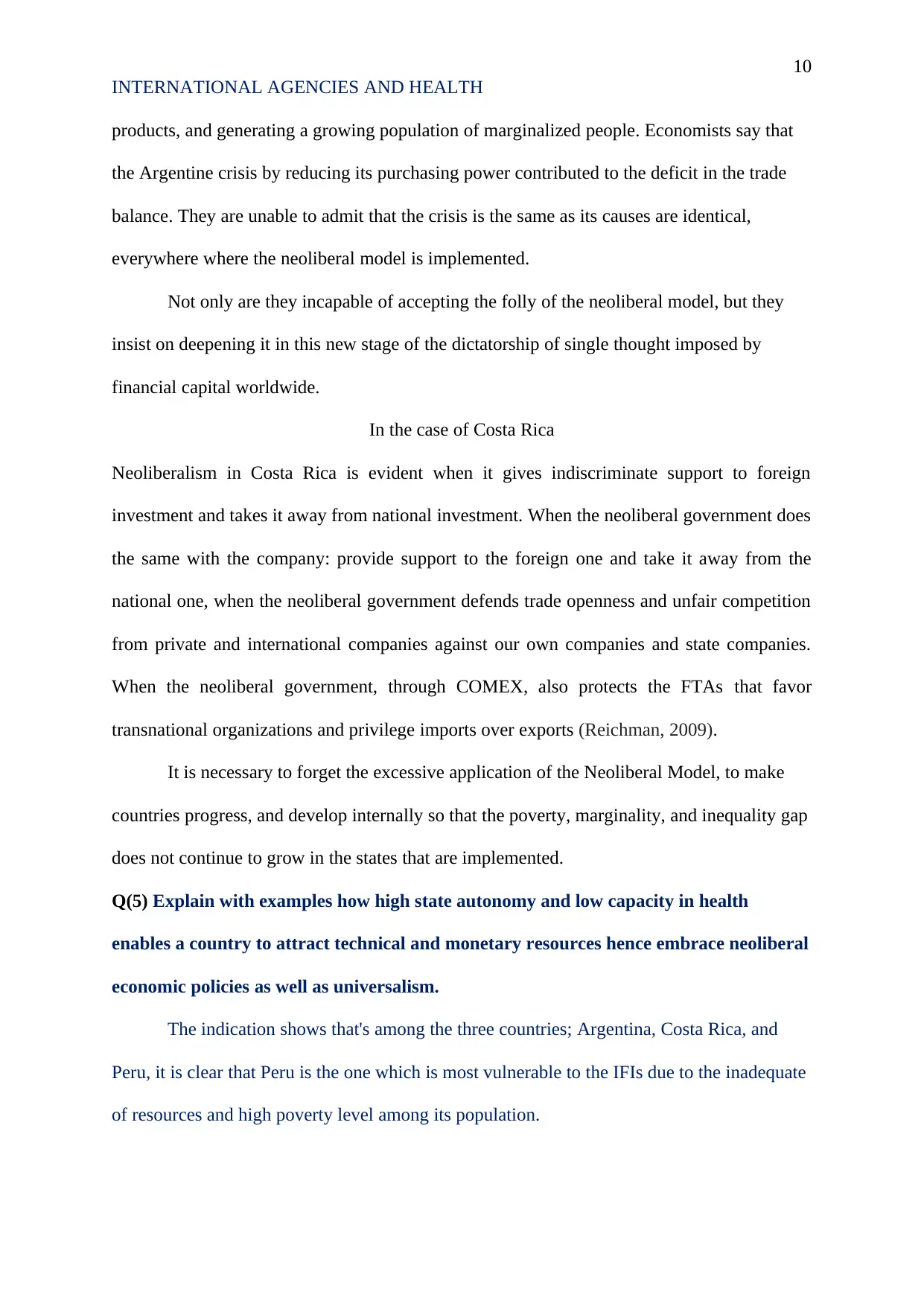
INTERNATIONAL AGENCIES AND HEALTH
products, and generating a growing population of marginalized people. Economists say that
the Argentine crisis by reducing its purchasing power contributed to the deficit in the trade
balance. They are unable to admit that the crisis is the same as its causes are identical,
everywhere where the neoliberal model is implemented.
Not only are they incapable of accepting the folly of the neoliberal model, but they
insist on deepening it in this new stage of the dictatorship of single thought imposed by
financial capital worldwide.
In the case of Costa Rica
Neoliberalism in Costa Rica is evident when it gives indiscriminate support to foreign
investment and takes it away from national investment. When the neoliberal government does
the same with the company: provide support to the foreign one and take it away from the
national one, when the neoliberal government defends trade openness and unfair competition
from private and international companies against our own companies and state companies.
When the neoliberal government, through COMEX, also protects the FTAs that favor
transnational organizations and privilege imports over exports (Reichman, 2009).
It is necessary to forget the excessive application of the Neoliberal Model, to make
countries progress, and develop internally so that the poverty, marginality, and inequality gap
does not continue to grow in the states that are implemented.
Q(5) Explain with examples how high state autonomy and low capacity in health
enables a country to attract technical and monetary resources hence embrace neoliberal
economic policies as well as universalism.
The indication shows that's among the three countries; Argentina, Costa Rica, and
Peru, it is clear that Peru is the one which is most vulnerable to the IFIs due to the inadequate
of resources and high poverty level among its population.
10
products, and generating a growing population of marginalized people. Economists say that
the Argentine crisis by reducing its purchasing power contributed to the deficit in the trade
balance. They are unable to admit that the crisis is the same as its causes are identical,
everywhere where the neoliberal model is implemented.
Not only are they incapable of accepting the folly of the neoliberal model, but they
insist on deepening it in this new stage of the dictatorship of single thought imposed by
financial capital worldwide.
In the case of Costa Rica
Neoliberalism in Costa Rica is evident when it gives indiscriminate support to foreign
investment and takes it away from national investment. When the neoliberal government does
the same with the company: provide support to the foreign one and take it away from the
national one, when the neoliberal government defends trade openness and unfair competition
from private and international companies against our own companies and state companies.
When the neoliberal government, through COMEX, also protects the FTAs that favor
transnational organizations and privilege imports over exports (Reichman, 2009).
It is necessary to forget the excessive application of the Neoliberal Model, to make
countries progress, and develop internally so that the poverty, marginality, and inequality gap
does not continue to grow in the states that are implemented.
Q(5) Explain with examples how high state autonomy and low capacity in health
enables a country to attract technical and monetary resources hence embrace neoliberal
economic policies as well as universalism.
The indication shows that's among the three countries; Argentina, Costa Rica, and
Peru, it is clear that Peru is the one which is most vulnerable to the IFIs due to the inadequate
of resources and high poverty level among its population.
10
Paraphrase This Document
Need a fresh take? Get an instant paraphrase of this document with our AI Paraphraser
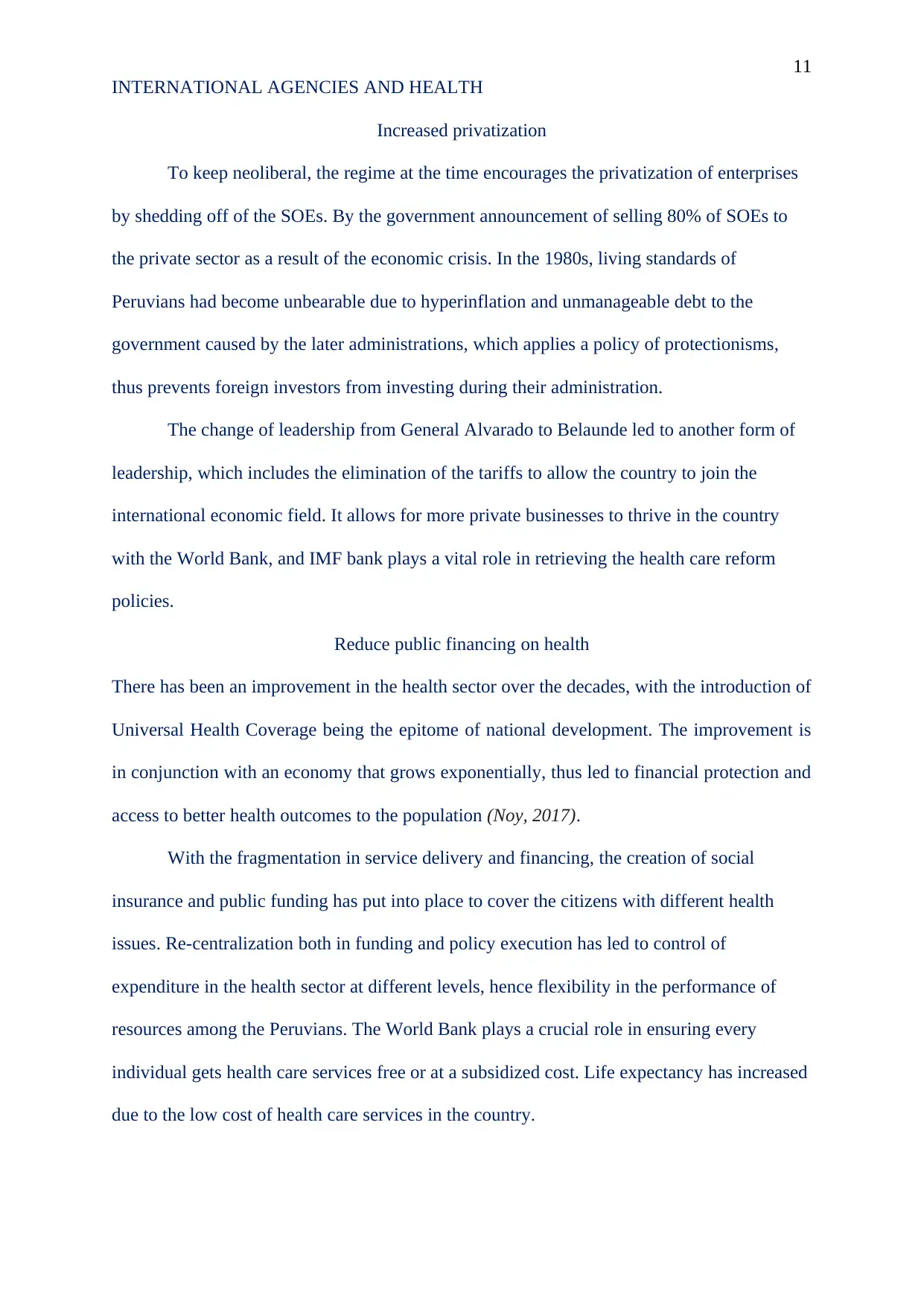
INTERNATIONAL AGENCIES AND HEALTH
Increased privatization
To keep neoliberal, the regime at the time encourages the privatization of enterprises
by shedding off of the SOEs. By the government announcement of selling 80% of SOEs to
the private sector as a result of the economic crisis. In the 1980s, living standards of
Peruvians had become unbearable due to hyperinflation and unmanageable debt to the
government caused by the later administrations, which applies a policy of protectionisms,
thus prevents foreign investors from investing during their administration.
The change of leadership from General Alvarado to Belaunde led to another form of
leadership, which includes the elimination of the tariffs to allow the country to join the
international economic field. It allows for more private businesses to thrive in the country
with the World Bank, and IMF bank plays a vital role in retrieving the health care reform
policies.
Reduce public financing on health
There has been an improvement in the health sector over the decades, with the introduction of
Universal Health Coverage being the epitome of national development. The improvement is
in conjunction with an economy that grows exponentially, thus led to financial protection and
access to better health outcomes to the population (Noy, 2017).
With the fragmentation in service delivery and financing, the creation of social
insurance and public funding has put into place to cover the citizens with different health
issues. Re-centralization both in funding and policy execution has led to control of
expenditure in the health sector at different levels, hence flexibility in the performance of
resources among the Peruvians. The World Bank plays a crucial role in ensuring every
individual gets health care services free or at a subsidized cost. Life expectancy has increased
due to the low cost of health care services in the country.
11
Increased privatization
To keep neoliberal, the regime at the time encourages the privatization of enterprises
by shedding off of the SOEs. By the government announcement of selling 80% of SOEs to
the private sector as a result of the economic crisis. In the 1980s, living standards of
Peruvians had become unbearable due to hyperinflation and unmanageable debt to the
government caused by the later administrations, which applies a policy of protectionisms,
thus prevents foreign investors from investing during their administration.
The change of leadership from General Alvarado to Belaunde led to another form of
leadership, which includes the elimination of the tariffs to allow the country to join the
international economic field. It allows for more private businesses to thrive in the country
with the World Bank, and IMF bank plays a vital role in retrieving the health care reform
policies.
Reduce public financing on health
There has been an improvement in the health sector over the decades, with the introduction of
Universal Health Coverage being the epitome of national development. The improvement is
in conjunction with an economy that grows exponentially, thus led to financial protection and
access to better health outcomes to the population (Noy, 2017).
With the fragmentation in service delivery and financing, the creation of social
insurance and public funding has put into place to cover the citizens with different health
issues. Re-centralization both in funding and policy execution has led to control of
expenditure in the health sector at different levels, hence flexibility in the performance of
resources among the Peruvians. The World Bank plays a crucial role in ensuring every
individual gets health care services free or at a subsidized cost. Life expectancy has increased
due to the low cost of health care services in the country.
11
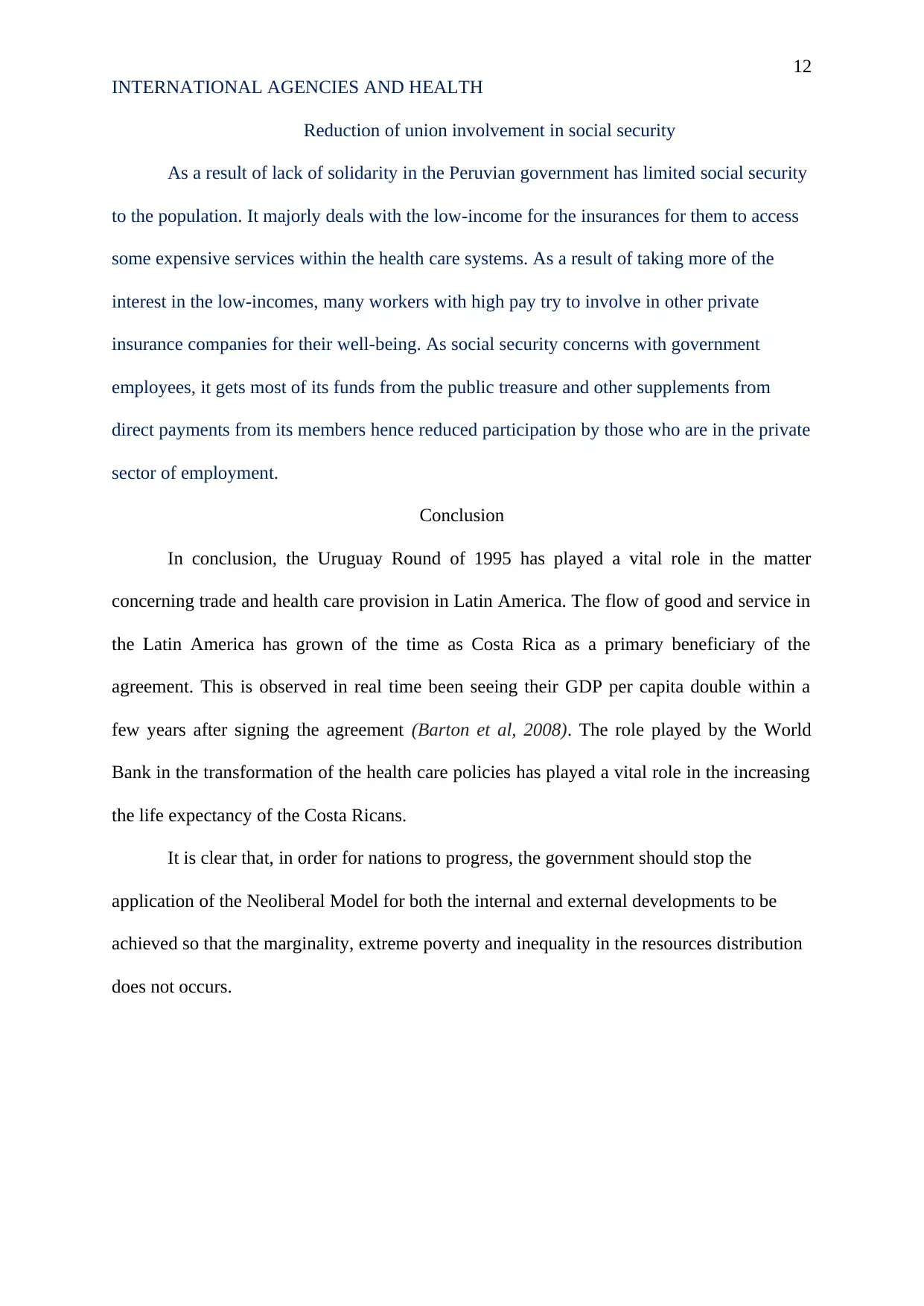
INTERNATIONAL AGENCIES AND HEALTH
Reduction of union involvement in social security
As a result of lack of solidarity in the Peruvian government has limited social security
to the population. It majorly deals with the low-income for the insurances for them to access
some expensive services within the health care systems. As a result of taking more of the
interest in the low-incomes, many workers with high pay try to involve in other private
insurance companies for their well-being. As social security concerns with government
employees, it gets most of its funds from the public treasure and other supplements from
direct payments from its members hence reduced participation by those who are in the private
sector of employment.
Conclusion
In conclusion, the Uruguay Round of 1995 has played a vital role in the matter
concerning trade and health care provision in Latin America. The flow of good and service in
the Latin America has grown of the time as Costa Rica as a primary beneficiary of the
agreement. This is observed in real time been seeing their GDP per capita double within a
few years after signing the agreement (Barton et al, 2008). The role played by the World
Bank in the transformation of the health care policies has played a vital role in the increasing
the life expectancy of the Costa Ricans.
It is clear that, in order for nations to progress, the government should stop the
application of the Neoliberal Model for both the internal and external developments to be
achieved so that the marginality, extreme poverty and inequality in the resources distribution
does not occurs.
12
Reduction of union involvement in social security
As a result of lack of solidarity in the Peruvian government has limited social security
to the population. It majorly deals with the low-income for the insurances for them to access
some expensive services within the health care systems. As a result of taking more of the
interest in the low-incomes, many workers with high pay try to involve in other private
insurance companies for their well-being. As social security concerns with government
employees, it gets most of its funds from the public treasure and other supplements from
direct payments from its members hence reduced participation by those who are in the private
sector of employment.
Conclusion
In conclusion, the Uruguay Round of 1995 has played a vital role in the matter
concerning trade and health care provision in Latin America. The flow of good and service in
the Latin America has grown of the time as Costa Rica as a primary beneficiary of the
agreement. This is observed in real time been seeing their GDP per capita double within a
few years after signing the agreement (Barton et al, 2008). The role played by the World
Bank in the transformation of the health care policies has played a vital role in the increasing
the life expectancy of the Costa Ricans.
It is clear that, in order for nations to progress, the government should stop the
application of the Neoliberal Model for both the internal and external developments to be
achieved so that the marginality, extreme poverty and inequality in the resources distribution
does not occurs.
12
⊘ This is a preview!⊘
Do you want full access?
Subscribe today to unlock all pages.

Trusted by 1+ million students worldwide
1 out of 13
Related Documents
Your All-in-One AI-Powered Toolkit for Academic Success.
+13062052269
info@desklib.com
Available 24*7 on WhatsApp / Email
![[object Object]](/_next/static/media/star-bottom.7253800d.svg)
Unlock your academic potential
Copyright © 2020–2026 A2Z Services. All Rights Reserved. Developed and managed by ZUCOL.




